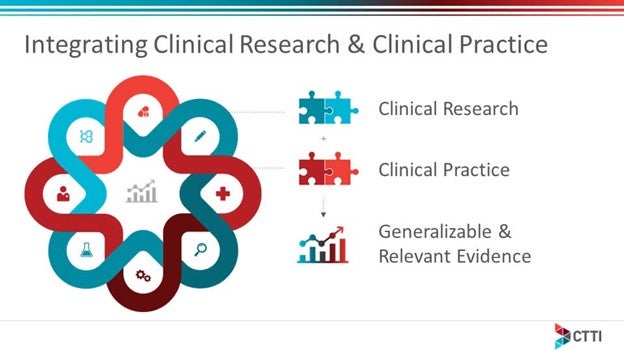Transforming Healthcare with Embedded Clinical Trials

Across the dynamic healthcare landscape, the possibility of merging clinical trials with everyday clinical care requires a transformative shift with far-reaching implications. Driven by industry-wide collaboration among experts, innovators, and regulatory authorities, this evolution seeks to embed clinical trials within standard healthcare practice. The goals: reduce redundancies, streamline the patient experience, and enhance the efficiency of clinical research.
Historically, clinical research operated separately from routine care. This disconnected approach prevented the use of data obtained throughout a patient’s medical journey (e.g., annual physicals) to inform treatment decisions, forcing patients to endure multiple visits for the same (and frequently painful and invasive) examinations. This leads to data duplications—artificially inflating the data pool-and ultimately exacerbates unnecessary and preventable burdens on patients and healthcare providers.
Enter the embedded trial model: siloed research visits are eliminated by embracing an integrated, clinician-derived data and patient-reported outcome approach. This simplifies the patient journey and opens up research participation to a broader range of healthcare providers, including clinics and sites lacking the resources larger systems enjoy.
“Embedded trials employ tools and technologies that analyze a patient’s usual standard of care for a particular condition and assess how much of it can be leveraged for research.”
—Holly Robertson, PhD, Head Advisory Services, Medidata
Through this process, clinicians receive a holistic, 360° view of individual patients, enabling them to develop better treatment outcomes regardless of a site’s size or access to resources while relieving patients of excessive evaluations. This synergistic approach highlights the critical role of technology in modernizing clinical research, with innovations like Medidata Health Record Connect (HRC) facilitating the integration of electronic health record data into clinical research databases, easing the data collection process and enabling more informed clinical decisions.

Derived from the Clinical Trials Transformative Initiative (CTTI)
In addition to patient benefits, the embedded clinical trial model significantly alleviates site burden. Traditionally, research-only visits require substantial resources and are often "squeezed" between regular clinic activities. This stresses available clinic resources and results in less-than-ideal conditions for site staff and patients. Managing multiple studies necessitates additional documentation and adherence to study-specific processes, increasing clinicians’ workload and labor-intensive operations.
Another critical component involves the monitoring required to review data entered, often cross-referenced against electronic health records. By leveraging data directly from health records through HRC and embracing eSource data, the need for onsite monitoring visits is decreased, freeing up valuable time for sites to dedicate to patient care.
As we look ahead to the future, the significance of technology that fuses clinical trial data with information derived from regular, day-to-day doctor or hospital visits grows increasingly apparent. These tools promise a more comprehensive approach toward patient care and site support and enhance the quality and relevance of research data. Reducing repetitive interventions and strategically repurposing existing data archives empowers researchers to redirect their time and attention toward driving meaningful patient outcomes.
Medidata is at the forefront of this paradigm shift towards a patient-centric research ecosystem, where technology, clinical research, and patient care are not seen as distinct entities but as complementary aspects of a unified healthcare journey. Despite the challenges, the potential benefits for patients, providers, and the broader research community are immense.
Championing an embedded clinical trial approach is the first step toward making them possible.
Learn more about Medidata Health Record Connect.
Enjoyed this article? Click here to share it with your network.
Contact Us
